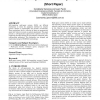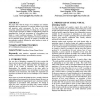1225 search results - page 4 / 245 » Design Principles for Intelligent Environments |
139
click to vote
ATAL
2007
Springer
15 years 8 months ago
2007
Springer
Multiagent environments are often not cooperative nor collaborative; in many cases, agents have conflicting interests, leading to adversarial interactions. This paper presents a ...
ATAL
2008
Springer
15 years 4 months ago
2008
Springer
Self-organizing multi-agent systems (MAS) use different mechanisms to mimic the adaptation exhibited by complex systems situated in unpredictable and dynamic environments. These m...
120
click to vote
CEC
2007
IEEE
15 years 8 months ago
2007
IEEE
— A sensor network is a collection of wireless devices that are able to monitor physical or environmental conditions. These devices are expected to operate autonomously, be batte...
118
click to vote
IUI
2004
ACM
15 years 7 months ago
2004
ACM
The paper deals with the design of an intelligent user interface augmenting the user experience in a museum domain, by providing and immersive audio environment. We focus on the i...
131
click to vote
AAMAS
2000
Springer
15 years 2 months ago
2000
Springer
We adopt the decision-theoretic principle of expected utility maximization as a paradigm for designing autonomous rational agents, and present a framework that uses this paradigm t...


